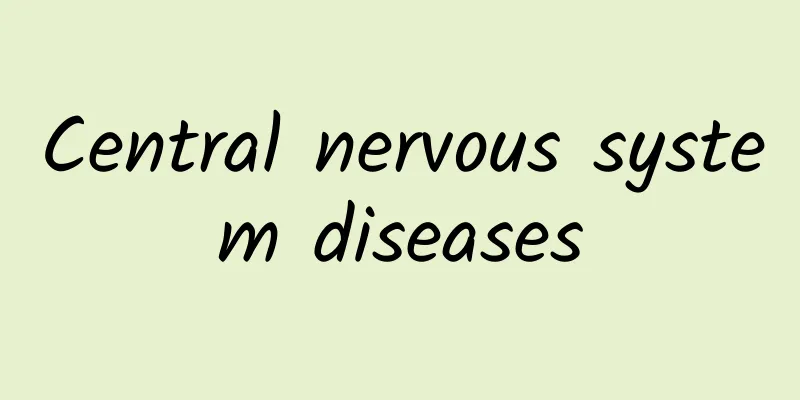Central nervous system diseases

|
Many people do not understand the concept of the central nervous system, so they are confused about this type of disease. Why does this type of disease occur? This is inseparable from our daily body's contact with the outside world, so we must pay more attention to diseases in this area, especially for serious symptoms, we must pay attention to timely care and go to the hospital to receive treatment from a doctor in time. Many centers control the orderly operation of our body's internal structures and are also very important for the metabolic system of the internal environment controlled by nerves. The occurrence of this type of disease can easily lead to other complications, so early treatment of the disease is very important. Metal poisoning, such as lead poisoning, can cause peripheral motor nerve paralysis and lead encephalopathy. Mercury, arsenic, and thallium poisoning also affect the nervous system. Organic poisoning, such as alcohol poisoning and barbiturate poisoning, can inhibit the central nervous system. Organophosphorus poisoning causes overexcitement of the choleretic nerves. Bacterial toxin poisoning, such as botulism, can cause cranial nerve paralysis and limb weakness. Diphtheria toxin can cause nerve paralysis. Tetanus toxin can cause systemic skeletal muscle rigidity and spasm. Animal poisons (toxins contained in coelenterates, shellfish, poisonous mosquitoes, spiders, pufferfish, etc.) can also cause neurological symptoms (muscle weakness, paralysis, convulsions, ataxia, etc.). Genetic defects Many metabolic diseases that affect the nervous system (such as phenylpropionic aciduria, glycogen storage disease, mucopolysaccharidosis, lipid storage disease), degenerative diseases (such as leukodystrophy, Parkinson's disease, amyotrophic lateral sclerosis, hereditary optic atrophy, etc.) and myopathies (such as progressive muscular dystrophy) are genetic diseases. Most of them are autosomal recessive. Hyperkalemic and hypokalemic periodic paralysis are inherited in an autosomal dominant manner. Nutritional disorders People with kwashiorkor (a form of protein-energy malnutrition) may have neurologic symptoms such as tremors, bradykinesia, and myoclonus. Vitamin A deficiency or poisoning can cause intracranial hypertension. Vitamin B deficiency can affect the nervous system. For example, vitamin B1 deficiency (beriberi) manifests as damage to most peripheral nerves, and vitamin B12 deficiency can cause subacute combined degeneration. Immune damage Post-vaccination encephalitis may be caused by an allergic reaction to the protein antigens contained in the vaccine. Infectious polyradiculoneuritis, facial nerve paralysis, post-infectious abducens nerve paralysis, post-infectious glossopharyngeal nerve paralysis, etc. may be allergic diseases of the peripheral nerves. Connective tissue diseases such as rheumatic fever, systemic lupus erythematosus, and polyarteritis nodosa are autoimmune diseases that can affect the nervous system. For example, rheumatic fever can manifest as Sydenham's chorea. Demyelinating diseases of the central nervous system may be autoimmune diseases caused by viral infections, such as diffuse sclerosis, acute disseminated encephalomyelitis, multiple sclerosis, subacute sclerosing panencephalitis, neuromyelitis optica, transverse myelitis, acute cerebellar ataxia, and central pontine myelinating disorder. Myasthenia gravis is also an autoimmune disease. Metabolic disorders In addition to the above-mentioned inherited metabolic diseases (such as glycogen storage disease, etc.) that can affect the nervous system, acquired metabolic diseases, such as hypoxia, hypernatremia, hyponatremia, hypocalcemia, uremia, hypoglycemia, hepatic encephalopathy, etc., can be accompanied by neurological symptoms. Endocrine disorders Thyroid hormones can promote brain myelination and stimulate RNA and protein synthesis. Children with cretinism have brain retardation and may have cerebellar ataxia. Hyperthyroidism may be accompanied by tremor and hyperreflexia of the tendons. In diabetes, insufficient insulin secretion causes demyelination of peripheral nerves and neurological disorders. Congenital malformations It may be caused by teratogens such as viruses or toxins, or it may be hereditary. Such as spina bifida, congenital hydrocephalus, brain perforation malformation, etc. Blood circulation disorders Vascular diseases, changes in blood components, hemodynamic disorders, or emboli can cause cerebrovascular diseases. Abnormal growth Abnormal tissue growth can form tumors. It can be seen in the central and peripheral nervous systems. Many neurological diseases have unknown causes and are often referred to as "primary". The central nervous system is related to the regulation of our internal environment. If any symptoms of disorder are found, rest and conditioning should be carried out in time. The treatment of the central nervous system is relatively complex and difficult to explore. There are reasons for the occurrence of these symptoms, so we must pay more attention to physical care in our daily lives. If you find any adverse symptoms in your daily life, you should seek medical attention in time and listen to the doctor's advice. |
>>: Life expectancy of patients with epilepsy
Recommend
What are the symptoms of encephalitis in adults?
Infants and young children have a relatively high...
Can black wolfberry be consumed with honey?
Black wolfberry, literally means black wolfberry....
Medical abortion with little bleeding and no gestational sac
Pregnant women who use medical abortion must pay ...
Abdominal pain after medical abortion
Nowadays, the technology of artificial abortion i...
In the hot summer, learn to take a bath like this to wash away the ten-year stubborn disease
The hot summer has arrived, and bathing has becom...
What causes right eye twitching?
I believe that every one of my friends has experi...
Mugwort plus one other thing can cure neck, shoulder, waist and leg pain! Twice is enough.
In spring, the humidity is heavier, and many old ...
Can Traditional Chinese Medicine Cure Vertigo?
Vertigo is what we usually call dizziness. When i...
Symptoms of hypocalcemia
Hypocalcemic convulsion is a disease that occurs ...
Treatment of myocardial infarction
There are many treatments for myocardial infarcti...
How many symptoms of kidney deficiency caused by excessive masturbation do you have?
As the saying goes, a man’s energy should be used...
Recurring urinary tract infections
Urinary tract infection is a condition that many ...
Borneol for external use on skin
Borneol appears very frequently in people's l...
Can a man with a fast heart rate have sex?
The incidence of heart disease in our country is ...
Symptoms of chronic mumps
Chronic mumps was formerly called chronic suppura...









